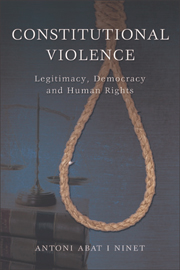3 - Democracy
Published online by Cambridge University Press: 05 August 2013
Summary
This chapter asks whether the disjunction between democracy and sovereignty might have its roots in the vagueness of the concept of democracy. Democracy is a concept that has had various meanings throughout history. Despite this difficulty it is essential to pin down the meaning of democracy because of its relationship with the main object of this book. If democracy is the only way to legitimise constitutionalism then we need to know what democracy means. The chapter starts by discussing an etymological and historical definition of democracy in an attempt to specify the semantic indeterminacy (Derrida) that affects the notion. The second section the chapter with an important issue related to the foundation of popular sovereignty: who are ‘the people’? And who determines who the people are? We will then discuss who the optimum are. From a positive-law perspective each legal system answers these questions, but this issue affects many other disciplines of thought, and gives rise to a wide variety of answers depending on each discipline's particular casuistry. The section deals with these two questions by starting with a reference to the American Constitution and by extension to other constitutional documents. Once the people and the optimum are defined, I examine the legitimisation of the role of the judiciary – the subject of ongoing analysis by Anglo-American jurisprudents. I develop this section by analysing the work of Michelman, Ackerman and Tushnet, but also Raz and Kutz, in an attempt to define the role of the judiciary from various perspectives.
- Type
- Chapter
- Information
- Constitutional ViolenceLegitimacy, Democracy and Human Rights, pp. 40 - 89Publisher: Edinburgh University PressPrint publication year: 2012

